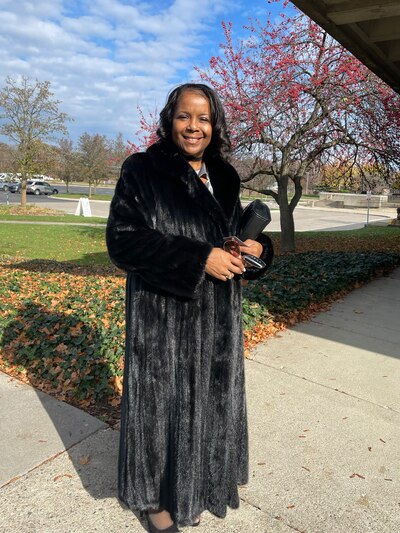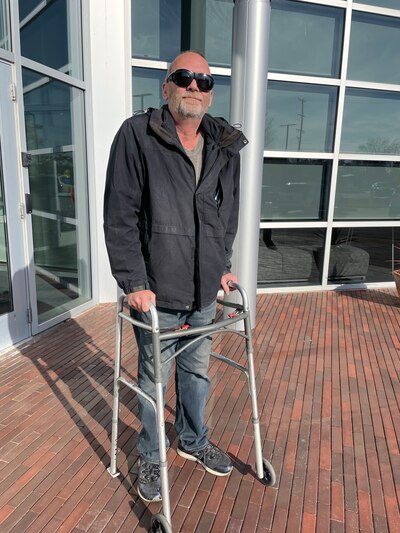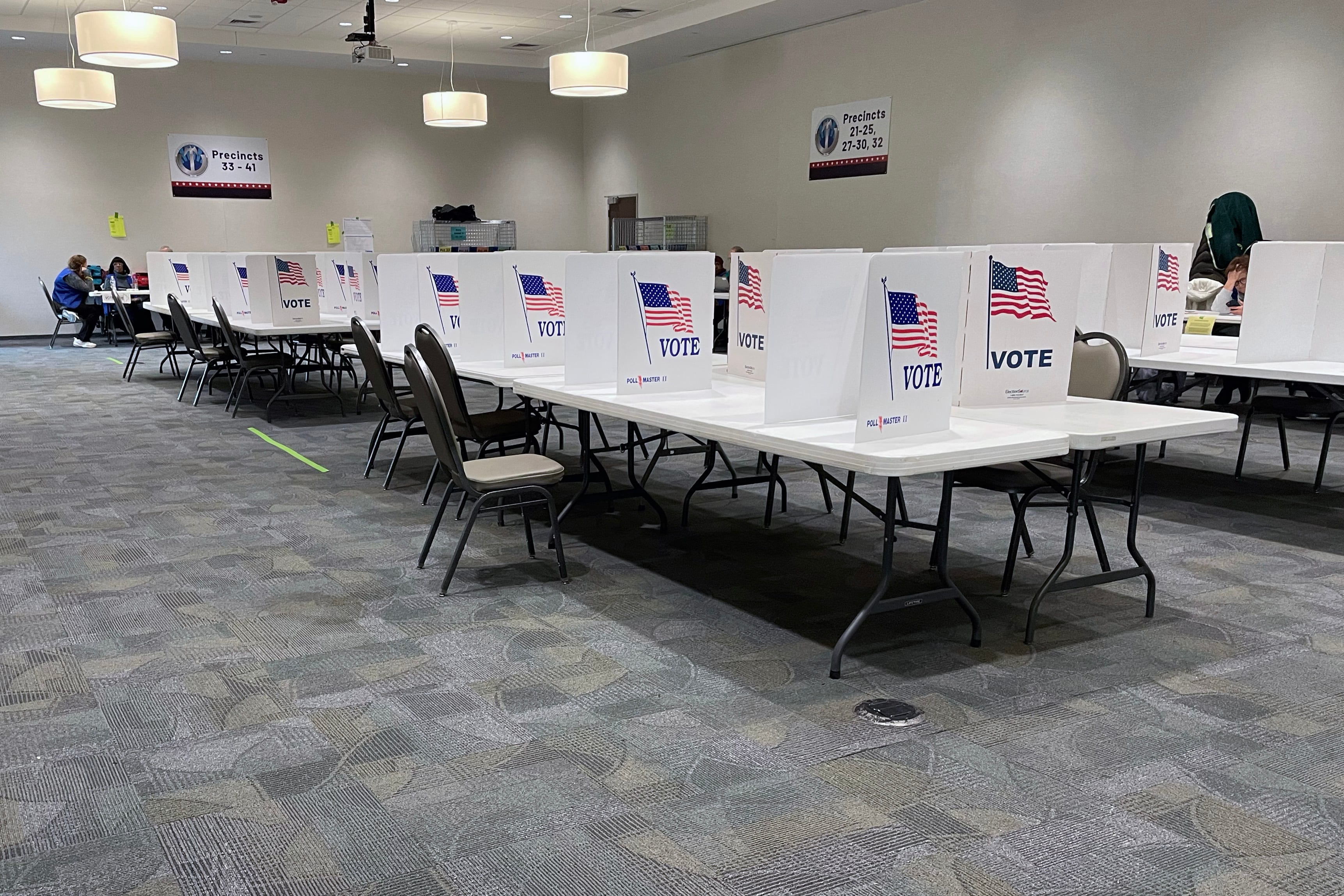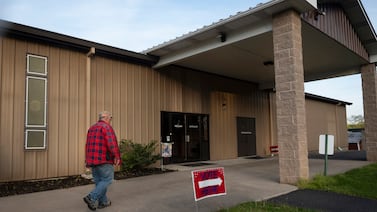Votebeat is a nonprofit news organization reporting on voting access and election administration across the U.S. Sign up for our free newsletters here.
More than 4,600 Michigan voters cast ballots in the state’s first foray into in-person early voting, prompting the secretary of state to declare it a successful pilot ahead of statewide early voting next year.
Nearly 40 cities and townships offered up to nine days of the new voting option allowing voters to feed their early ballots into polling place tabulators, just as they do on Election Day. Early voting is part of the expansive constitutional voting overhaul approved overwhelmingly by voters in November 2022. Those who came out during the past week to vote in the state’s scattered municipal elections, featuring local races such as city council and millage proposals, were enthusiastic about the option.
Participating clerks used the low-turnout election to pilot voting plans, practice setting up their new voting locations and using new equipment, and work out any kinks before 2024′s high-turnout elections. The state has offered $30 million in shared funding to cities and townships to buy equipment, hire staff, and pay for other necessities for early voting, including plans for 2024.
In Oakland County, home to this election’s most extensive early voting partnership, residents in 26 communities could cast their ballots early from Oct. 28 to Nov. 5. Oakland County Clerk Lisa Brown coordinated with local clerks to organize early voting into 12 regional sites — one of the early voting models local governments can choose to share costs and spread out the effort.
Other than what Brown described as a brief “hiccup” one day with electronic poll books used to check in voters, she said voting went smoothly for the 1,000 residents who tried it.
“The feedback was all positive,” Brown said. “The voters loved it. The workers loved it.”
At one of those regional sites, the Southfield Pavilion, five poll workers waited to greet voters as they trickled in early Sunday afternoon. A row of eight voting booths on both sides of the large meeting room also awaited voters.
Pejman Latify, the volunteer poll worker overseeing the site, said that although the turnout was light, the process was seamless. Latify estimated that 240 voters had shown up to vote at the Southfield site since Oct. 28.

Southfield resident Kimberly Mosley, who voted on Sunday, said early voting puts the voter in control by allowing them to better fit voting into their schedules.
“It was perfect,” said Mosley, an automotive designer. “I was able to go to church service and come here and vote.”
Mosley said she voted early so that she would have free time to campaign for her sister, who is running for re-election on the Southfield City Council, adding that she liked the ease and speed.
“No one was in line and I was able to get service right away and cast my vote,” she said.
Jackie and Carter Wood were among the 200 early voters in the city of Troy early Saturday afternoon. Jackie, a teacher, and Carter, a car engineer for Ford Motor Co., were all smiles as they left the Troy Community Center after casting their votes.
“It was easy. No lines!” Jackie Wood said. “We were in and out quickly. That’s what makes it nice.”
Carter Wood said he also likes that he doesn’t have to take time off work to vote and can feed his ballot into a tabulator himself, part of the allure of early voting for the couple.
Laurrie Murphy Knight was also among Troy residents who decided to vote early.
“I thought the process was very easy,” said Knight, who works in health care. “I like to vote in person but without the crowd.”
Knight said she wishes there had been more of an effort to tell the public that early voting was taking place.
Further south in Westland, a small number of voters also decided to cast their ballots early.
About 90 residents turned out to vote in the downriver community, which was the only city in Wayne County that offered early voting. That meant the city clerk’s office conducted early voting on its own without a partnership — another model the state now allows.

For Westland resident Brian Rock, who is disabled and uses a walker to move about, being able to vote early helps him avoid crowded spaces.
Rock says he also wants to see his ballot actually go into the tabulator, which scans the ballots and deposits them into a secure box. The tabulator electronically stores the votes from ballots as they are cast, but by law, does not tally and report the results until 8 p.m. on Election Day.
“I find it more trustworthy when I get to see it go into the [tabulator],” said Rock after leaving Westland City Hall Thursday.
Secretary of State Jocelyn Benson celebrated the pilot in a press release Monday that thanked clerks for helping to pull off Michigan’s first-time early voting.
“From Lansing to East Grand Rapids to Westland to Oakland County, and several other communities in between, Michigan election officials met the movement and succeeded in laying the groundwork for successful early voting on a statewide level in 2024 and beyond,” she said in the statement.
The one glitch clerks reported was a 10-minute problem Monday morning preventing poll workers from logging into the electronic poll book system, which is used to check in voters.
Brown, in Oakland County, said no voters were affected because clerks had paper copies of the voter lists so that they could refer to them instead.
“We had backup … so that in case there was any issue, no one would ever have been prevented from voting,” she said.
Oak Park clerk Ed Norris, whose regional voting site also served the Oakland County communities of Berkley, Huntington Woods, and Pleasant Ridge and saw 140 voters, said the glitch was a non-issue.
“I was there when it happened,” said Norris Monday. “It didn’t last long and it happened so early. No voters were there so it didn’t affect any.”
Given the light use of early voting so far, Westland clerk Richard LeBlanc acknowledged a need to publicize the option. He said the messaging for this election was left to local clerks, and he used social media, announcements at public meetings, and word of mouth.
In Oakland, Brown said she sent out postcards and posted notices on social media and Oakland County’s website, but she hopes to also broadcast notices on a public access television channel in 2024.
Next election, LeBlanc expects help getting the word out.
“When the state does what many people expect it to do next year by announcing a complete full total rollout of early voting,” LeBlanc said, “more people will be aware. More people will engage that way.”
Oralandar Brand-Williams is a senior reporter for Votebeat in partnership with Bridge Michigan. Contact Oralandar at obrand-williams@votebeat.org.





